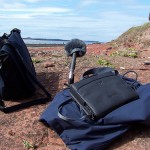Informational Interview Report: Field Recording

[Thanks to Winson for sharing his informational interview with a field recording engineer.]
I interviewed a field recording engineer who’s been working professionally for a few years now. He’s from New York and graduated from New York City’s Audio Research Institute as well as the University of Film and Television in Russia.
I met him when I was working on a relatively high budget student short film that hired professionals to work. I got to work on the set by offering to work for reference and credit only, though I got free lunches. 🙂 The film itself has made it to the regionals so far, and we’re continually excited to see it go further.
I became slightly more than acquaintances with him on set and stayed in contact with him through Facebook. There, I asked him to do a simple interview and he gladly did. He provided short but inspiring and informational responses to my interview questions, as well as a brief history on how he got to where he is today. He also interviewed me a bit.
What is your career goal?
To be the creative leader of the sound department in major films.
How did you get into this career?
Through contacts.
Are you part of a centralized system for finding work like a union/agency, or are you like a freelancer in a decentralized system? Do you have any particular comments about finding work as a field sound engineer?
I’m a decentralized freelancer.
What do you think is necessary to enter this field? Skills? Connections? Equipment?
For me passion equals skill level. Good friends and colleagues help getting into the business, but it’s passion that keeps you in it.
Do you find it easy to find work or difficult? Do you feel like more work is opening up as multimedia production seems to be growing more widespread due to the digital revolution, or do you think it’s negatively impacting the industry?
It’s not easy to find work in today’s economic situation. It’s unknown what will happen in the near future, but I think it will always be possible to find new creative tandems with people that you share the same views with. The digital revolution has its pros and cons.
I did some research on a boom operator’s minimum salary for contract jobs, and it turns out to somewhere around 41-48 dollars per hour. Do you think that’s an accurate measure? If not, what do you think is an average pay based on your experience?
That is true for medium to big budget productions. On lower budget productions producers try to not think about boom operators.
Lastly, if there’s one advice you could’ve given yourself when you just started out, what would it have been?
Stay calm and think two steps ahead.
Reflection
I did a tremendous amount of research on my career field already, so most of the information wasn’t too surprising. Most of what my interviewee said confirmed my research or expanded the thread in a little more concise way.
I knew the average salary of $48/hour is for medium to large budgets only. I knew it was important to have a healthy set of contacts to break your way into the industry. I also knew you’d need a “blow-your-mind” reel to be considered for a medium budget production. To be considered on a major motion picture production, you need to be part of a union and be on a producer’s A-list. That is attainable through many years of working.
The entire interview was a great opportunity to compare notes for what worked and continues to work for my interviewee to what I’m doing, which is actually very similar. The only difference is I don’t have $40,000 worth of equipment and a reel of impressive and artsy videos.
The interview definitely had a slight negative tone about the industry right now, but I firmly believe that the digital revolution’s lowering cost of prosumer production products will interest many small companies who are just starting out to make high quality production without consulting Hollywood professionals. That’ll be good until I can find a way to break into the industry.
The interview let me know I was on the right path to pursing field recording as a profession: pursuing a degree while working on as many projects for pay or for free and joining a union when I get a chance. I’ll figure out which one to do later on. The interview experience was enjoyable and relaxed; we’re friends now so it was relatively simple.
I thanked my friend in person and bought him an In-N-Out double cheeseburger meal. He said he’d look for me if I’m interested to do boom operating for him again. That burger seemed to have gone over well. 🙂